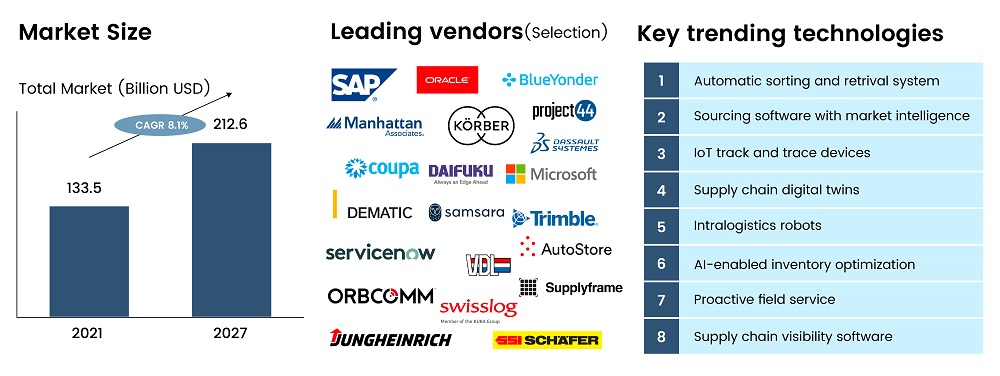The global supply chain emerged as one of the primary casualties of the pandemic, propelling VCs into action as they sought to invest in companies tackling the multifaceted challenges within this crucial sector. In 2021, VC funding in supply chain tech soared to $60.8 billion (about $190 per person in the US), per Pitchbook, up 70% year-on-year. Although the funding momentum has somewhat tempered since then, investments in 2022 have consistently maintained levels equivalent to or even surpassing historical levels. This sustained funding underscores the profound significance of supply chain technology in mitigating disruptions and optimizing efficiency.
Read more: Innovation in Defense Tech: Private Funding Opportunities on the Rise
Figure 1: Market Snapshot: Digital Supply Chain 2022

Source: IoT Analytics
Read more: Secondary Deals to Heat Up as IPO Slowdown Continues
While supply chain disruptions have eased since 2021, the Global Supply Chain Pressure Index – an index that tracks the state of global supply chains using data from the transportation and manufacturing sectors – is still higher when compared with historic levels. With ongoing geopolitical conflicts, the profound impacts of inflationary pressures and recessionary environments, the consequences of climate change-induced weather events, or unforeseen challenges lurking on the horizon, the flow of goods will undoubtedly continue to be hampered.
The interplay of these multifaceted factors necessitates the widespread adoption of resilient and adaptive technologies within the supply chain landscape. Accordingly, innovation in critical domains such as predictive analytics, artificial intelligence, blockchain, and robotics holds ever-increasing importance and aims to mitigate risks and optimize the intricate workings of supply chain operations. This is also evident from a Gartner survey of supply chain leaders which found that 73% of supply chain IT budgets this year will be allocated to growth and performance enhancements.
Read more: National Cybersecurity Strategy: Net Positive for the Cyber and Cloud Security Sector

The landscape of supply chain technology continues to evolve as several innovative companies secure substantial venture capital investments. Overhaul, a dynamic player that harnesses the power of artificial intelligence to fortify the security of physical supply chains, recently achieved a significant milestone by securing an impressive $73 million in equity and debt. Pando, another AI-powered supply chain startup, recently secured $30 million, highlighting the confidence placed in its groundbreaking approach to optimizing and streamlining complex supply chain operations. Everstream, a trailblazer in harnessing the potential of big data for supply chain management, successfully raised $50 million, underlining the growing recognition of data-driven insights as a catalyst for enhancing operational efficiency and informed decision-making throughout the supply chain ecosystem. Altana, an AI-powered platform that provides comprehensive insights into complex supply networks, also secured $100 million.
These strategic investments collectively underscore the increasing realization of the transformative role that technology plays in reshaping supply chain dynamics. As the industry continues to embrace technological innovations, these investments serve as a testament to the immense potential for technology to revolutionize supply chain operations, ushering in a new era of agility, optimization, and strategic advantage.
Read more: US Job Growth Report: Why is the Market Slowing Down?

In the ever-evolving landscape of supply chain management, innovative technologies are playing a crucial role in driving efficiency, reliability, and competitiveness. Looking ahead, technologies such as fog computing, robotics, inventory tools, and advanced analytics will continue to improve supply chain operations. By dispersing data across multiple servers, fog computing eliminates the reliance on a single point of failure, making big-data analytics more secure and stable. The integration of robotics in supply chain operations has triggered a seismic shift in warehouse management. Gartner expects 75% of large enterprises to embrace these robotics and autonomy by 2026. Organizations are also increasingly turning to inventory tools to streamline their production, storage, and distribution processes. These tools leverage advanced analytics, artificial intelligence (AI), and data science to unlock the full potential of inventory management. Research from Gartner also suggest that more than 75% of commercial supply chain management application vendors will embed advanced analytics, AI, and data science into their solutions, enabling organizations to make data-driven decisions and achieve operational excellence by 2026.
With a presence in New York, San Francisco, Austin, Seattle, Toronto, London, Zurich, Pune, Bengaluru, and Hyderabad, SG Analytics, a pioneer in Research and Analytics, offers tailor-made services to enterprises worldwide.
Partner of choice for lower middle market-focused Investment Banks and Private Equity firms, SG Analytics provides offshore analysts to support across the deal life cycle. Our complimentary access to a full back-office research ecosystem (database access, graphics team, sector & domain experts, and technology-driven automation of tactical processes) positions our clients to win more deal mandates and execute these deals in the most efficient manner.









